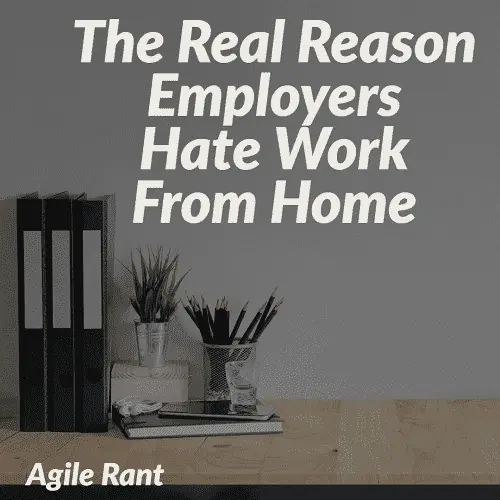In the rapidly evolving landscape of the modern workplace, one contentious topic seems to ignite passionate debates across boardrooms and watercoolers alike – work from home.
As professionals around the globe experienced the unprecedented shift to working from home, it became evident that this transformative arrangement isn’t without its detractors. Even when it is such a benefit to employees and allows for top talent attraction, employers look down on it. Why do some employers resist work from home, even when it could help their businesses?
Enter the perspective of employers who, for a multitude of reasons, harbor reservations and, in some cases, outright disdain for the work-from-home movement. In this gripping exploration, we delve into the factors that drive this resistance, unearthing the complexities that underlie their apprehensions.
Prepare to unlock the hidden truths behind why some employers seemingly loathe the idea of work from home, challenging conventional beliefs and sparking a thought-provoking conversation on the future of work and productivity. Join us as we navigate the uncharted waters of employer sentiments, seeking to understand their perspective in this ever-evolving professional landscape.
Reasons Employers Hate Work From Home
While work from home has become more common and accepted in recent years, some employers may still have reservations about adopting a full work from home model. Here are five reasons why some employers may be hesitant:
Lack of Control and Monitoring
Employers may be concerned that they won’t have the same level of oversight and control over their employees’ work when they are not physically present in the office. They may worry about productivity levels, time management, and the ability to track progress on projects for their businesses..
Communication Challenges
Effective communication is crucial for any successful business. Some employers may believe that work from home hinders real-time collaboration and spontaneous idea sharing, leading to delays in decision-making and potential miscommunication among team members.
There are also thoughts that it is more difficult to take care of customers and clients. Because the ability to handle customer service in a remote environment is not always well setup or capabilities are not understood by employers.
Team Cohesion and Culture
Physical proximity in a traditional office setting can foster a strong sense of team cohesion and company culture. Employers may worry that work from home can lead to a sense of isolation among employees, making it difficult to maintain a unified and motivated team.
Business owners, employers and leaders often just don’t see that there are ways to build culture in a remote first environment. Sure, it can be more difficult. But, the flip side is that often companies and organizations do not do a great job of building culture in an on-site environment.
Technology and Security Concerns
Work from home relies heavily on technology, and some employers may be wary of potential technical issues and security vulnerabilities. The fear of data breaches or unauthorized access to sensitive information might discourage them from embracing work from home. But there are good tools available for work from home. Tools that make the job easier, allow for collaboration, and delivery of quality work.
Organizations may think the costs to acquire tools that promote remote first are expensive. But there are tools available for free or low cost. That can meet the needs of the business and allow for more remote opportunities.
Performance Evaluation
Employers may find it more challenging to assess the performance of remote employees compared to those working in an office environment. They may worry about how to measure productivity fairly and accurately, especially if job roles involve less tangible outputs.
It’s essential to recognize that not all employers share these concerns, and many have successfully adopted virtual work arrangements with positive outcomes for both employees and the company. The key is to address these concerns by implementing appropriate communication tools, setting clear expectations, and establishing trust between employers and employees.
Work From Home – What Does It All Come Down To
In the modern era of work, the rise of work from home has presented an unprecedented opportunity for employees to break free from the confines of traditional office settings and embrace a more flexible, balanced lifestyle.
However, despite the numerous advantages that work from home offers, many employers remain hesitant, and the real reason behind their reluctance is not as simple as it may seem. The crux of the matter lies in two fundamental pillars that form the bedrock of any successful organization: company culture and trust.
From the top levels of management, the company culture and trust must be right for work from home to thrive. Therefore, it is not just business reasons to consider if remote job opportunities work for the organization. Any business with people is impacted by their culture.
Work From Home And Company Culture
First and foremost, company culture serves as the essence of an organization, defining its values, beliefs, and collective identity. It is cultivated through daily interactions, shared experiences, and a sense of camaraderie that flourishes when employees work side by side. The physical office space, with its bustling hallways and communal areas, has traditionally been the breeding ground for this vital culture. However, with the transition to virtual work, some employers fear that this cohesive cultural fabric may start to fray.
In a work from home setup, face-to-face interactions are replaced by virtual meetings, emails, and chat messages. While technology has enabled seamless communication, it cannot entirely replicate the spontaneous exchanges and impromptu brainstorming sessions that occur in a physical office. The lack of these casual encounters may lead to a gradual erosion of camaraderie and a sense of disconnection among team members.
Trust To Work From Home
Moreover, the element of trust plays a pivotal role in the employer-employee relationship. When employees work remotely, there may be concerns about whether they are truly dedicating themselves to their tasks or succumbing to distractions. Employers might worry about the lack of visibility into virtual workers’ daily activities, leading to doubts about productivity and accountability.
In a traditional office, trust is often built through direct observation of an employee’s work ethic and performance. Management has direct insight and control of employee performance. However, in a work from home setting, this trust must be cultivated through other means. When employers are unable to trust their remote teams fully, it can lead to micromanagement, unnecessary check-ins, and a toxic atmosphere of suspicion that stifles creativity and innovation.
But does this mean work from home is doomed to fail in fostering a healthy culture and strong trust between employers and employees? Not necessarily. Companies that successfully embrace work from home often invest in building a remote-friendly culture intentionally. They prioritize clear communication, regular virtual team-building activities, and opportunities for open dialogue. Trust is cultivated through setting clear expectations, offering flexibility, and empowering employees to take ownership of their work.
In conclusion, the real reason why some employers harbor reservations about work from home boils down to concerns about maintaining a vibrant company culture and fostering a high level of trust. However, with conscious efforts, adaptable strategies, and a willingness to embrace change, work from home can thrive, and both employers and employees can reap the benefits of this modern work revolution. It doesn’t need to be the case that employers resist work from home if it can work for their business!
Additional Content To Check Out
A good read from flexjobs on why employers do not like work from home.
Without a daily commute, mandatory lunches, and the cost of office-appropriate attire, it may seem that working from home will peel some costs off your budget.
Source: investopedia.com
Decide where in the world makes sense for you, your role and your team, and we’ll explore it during the hiring process.
Source: lifeatspotify.com


